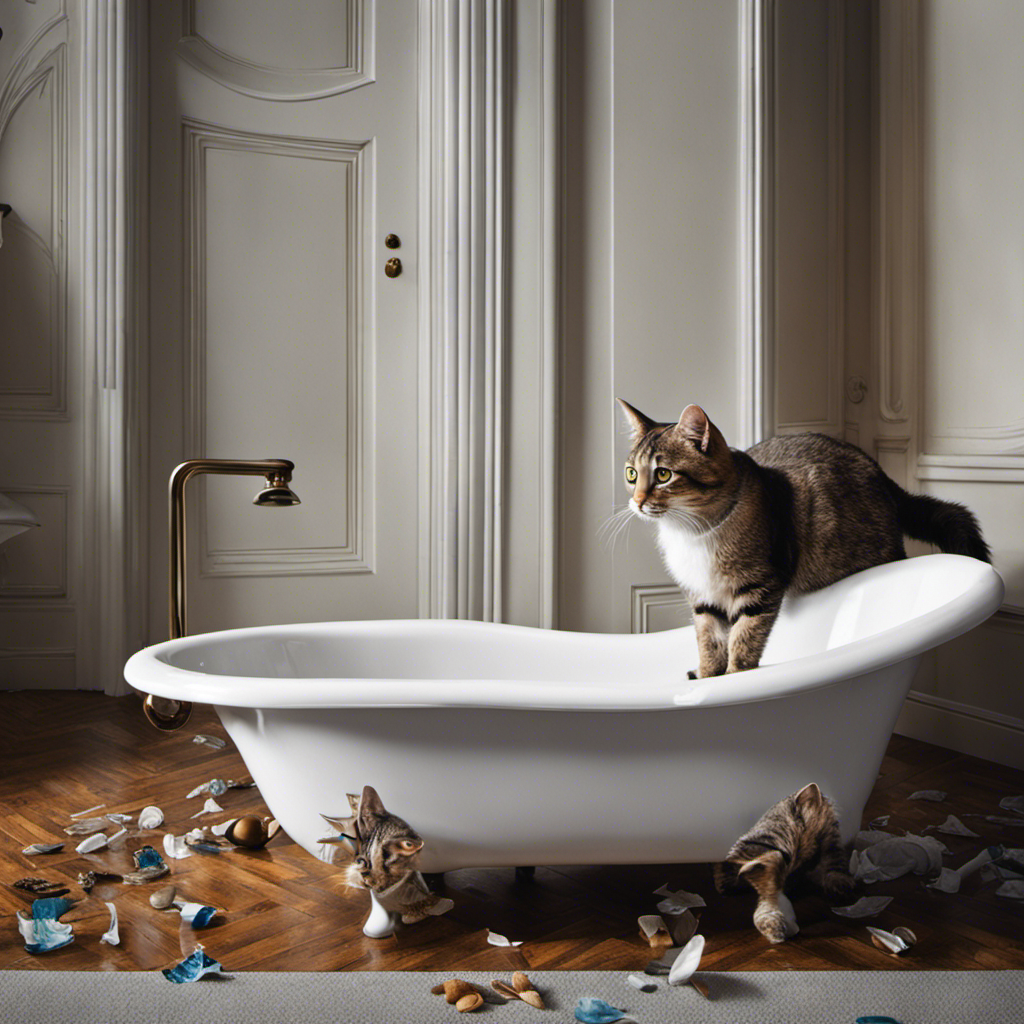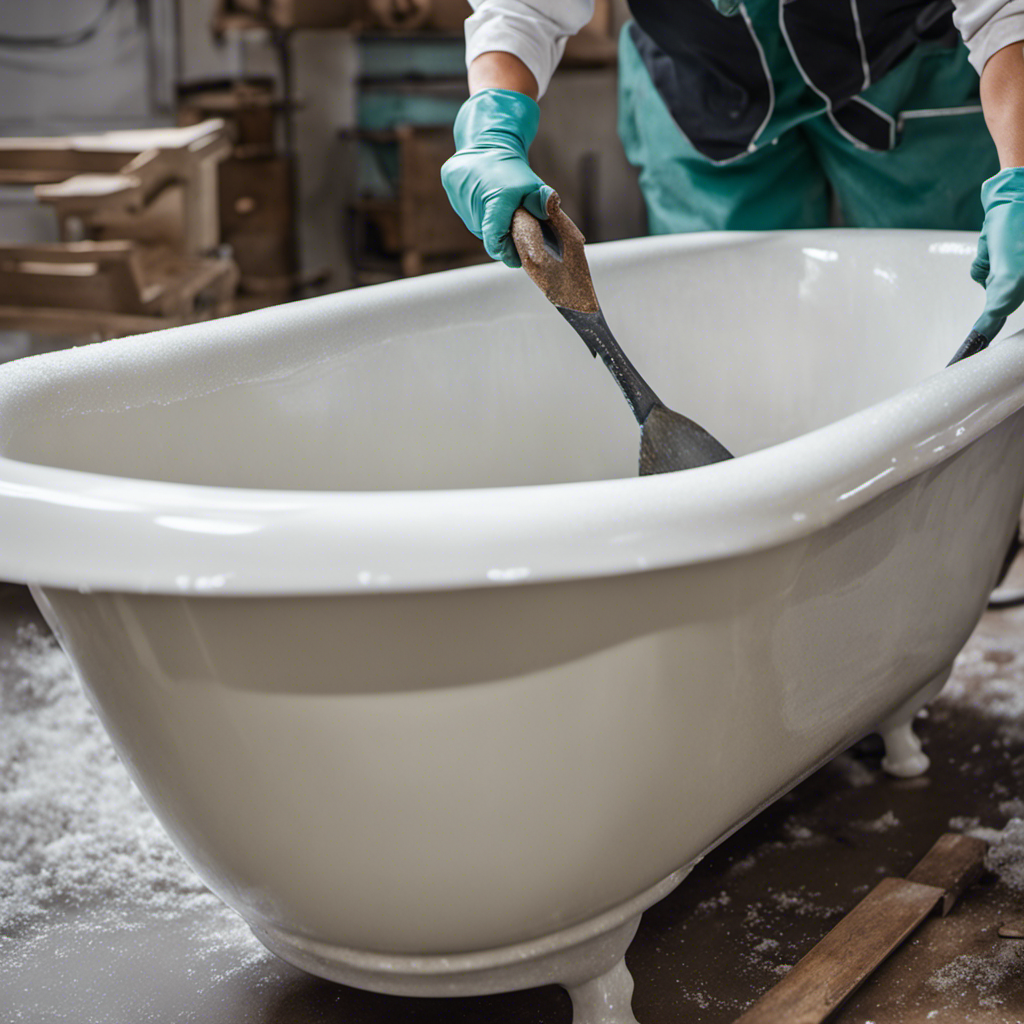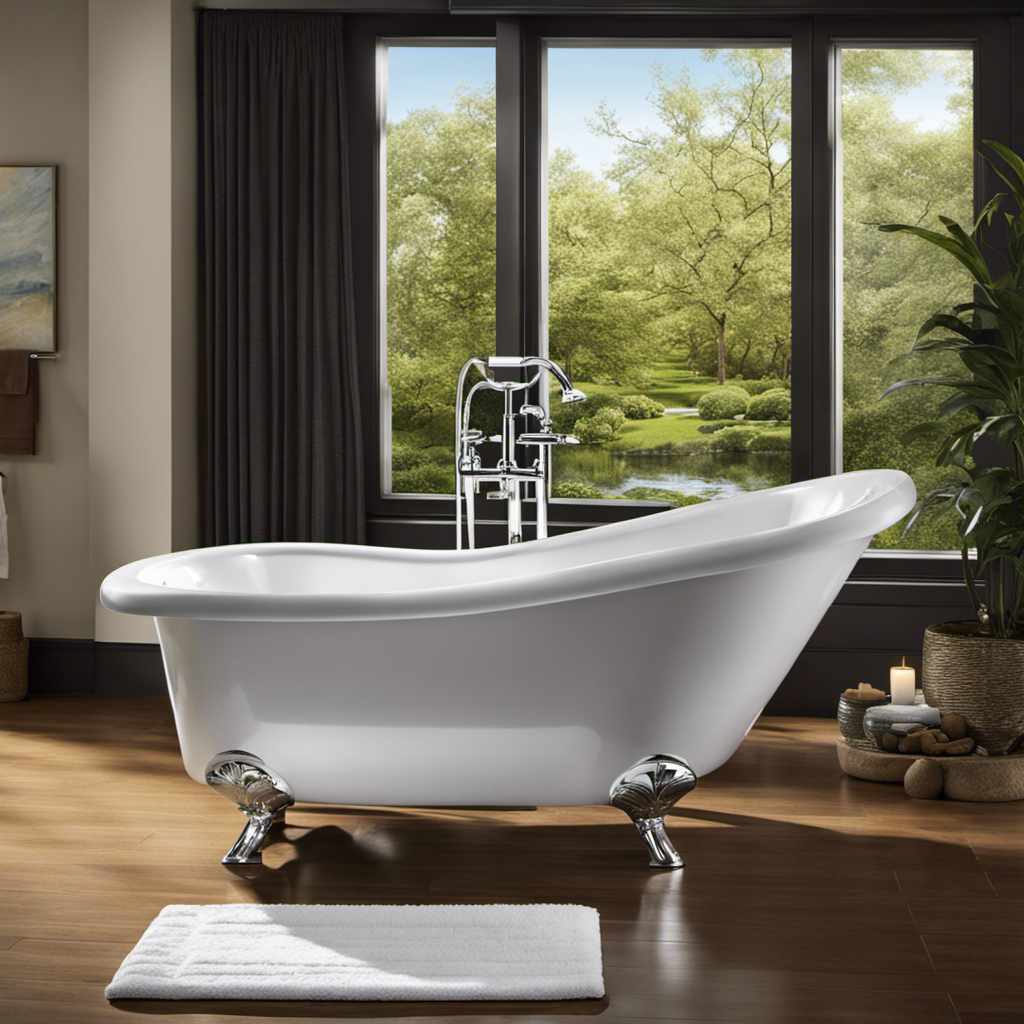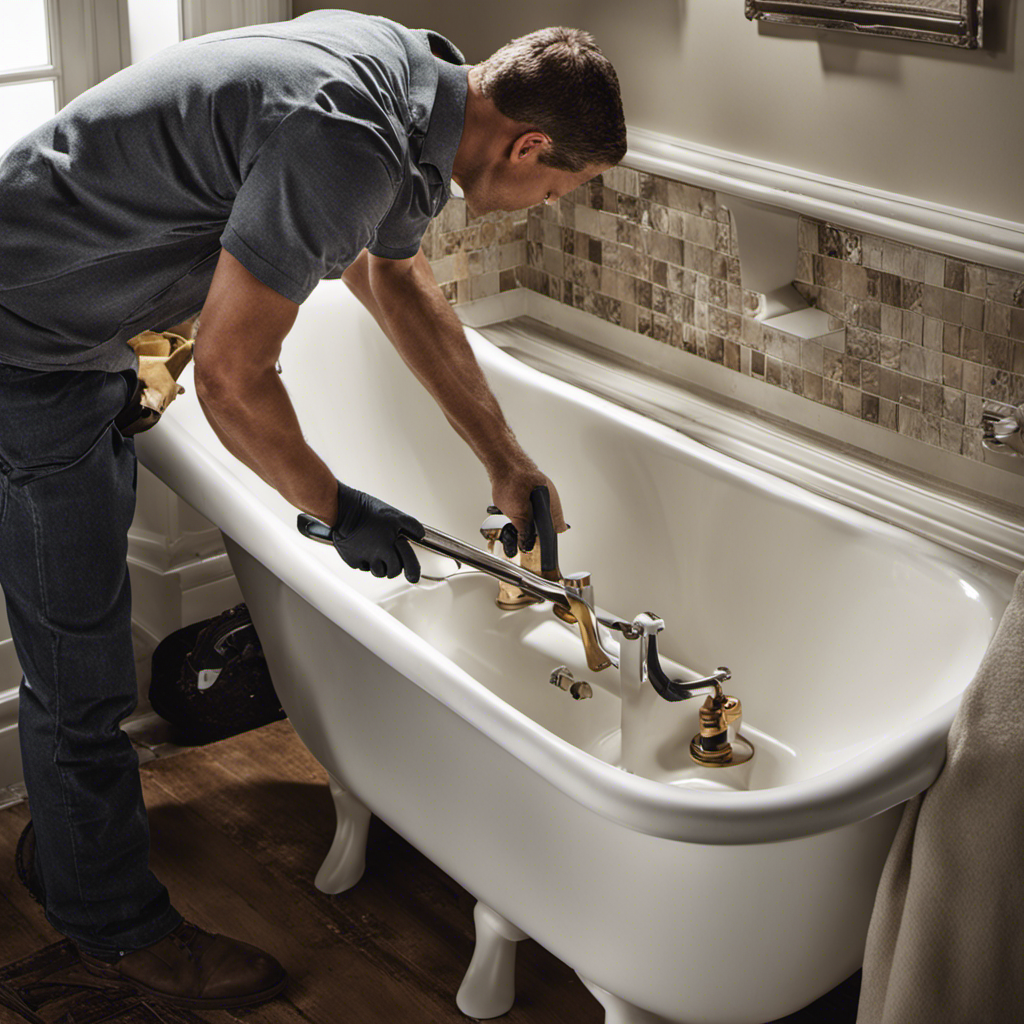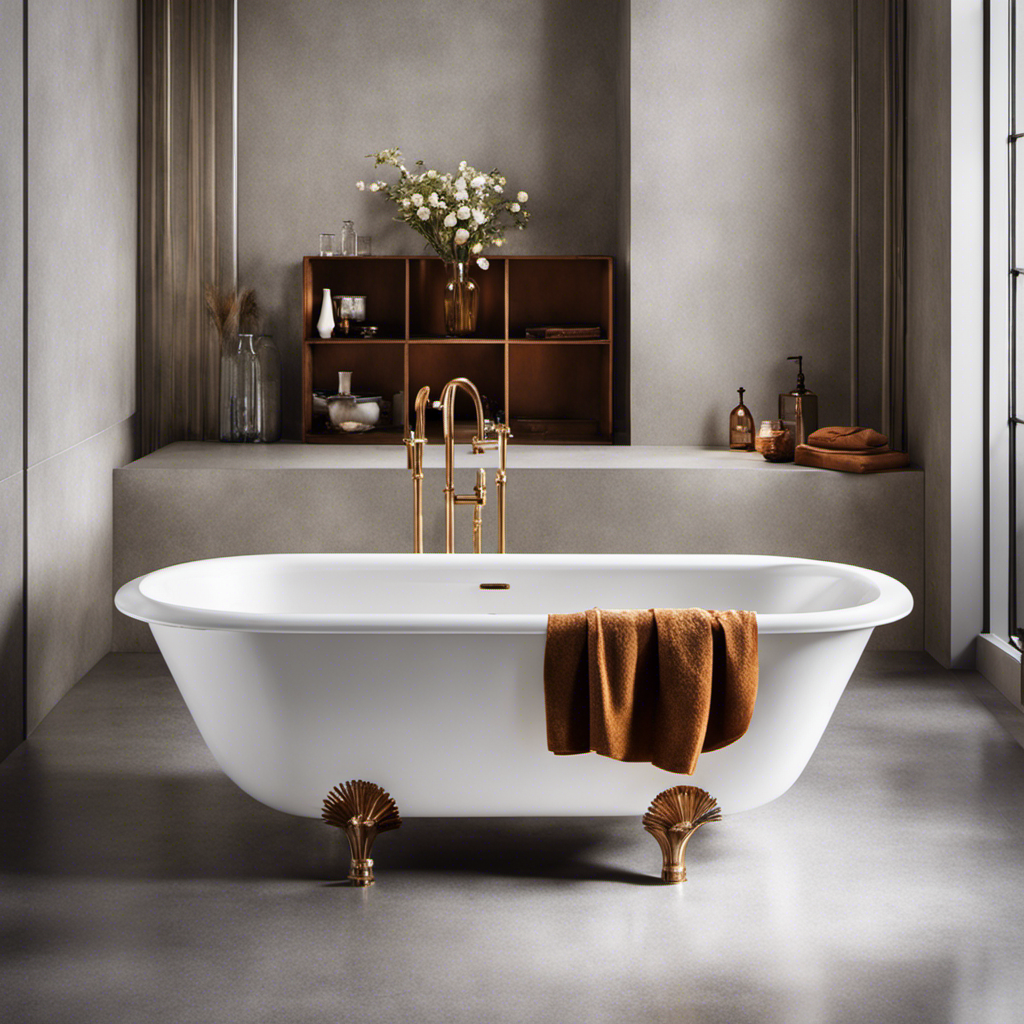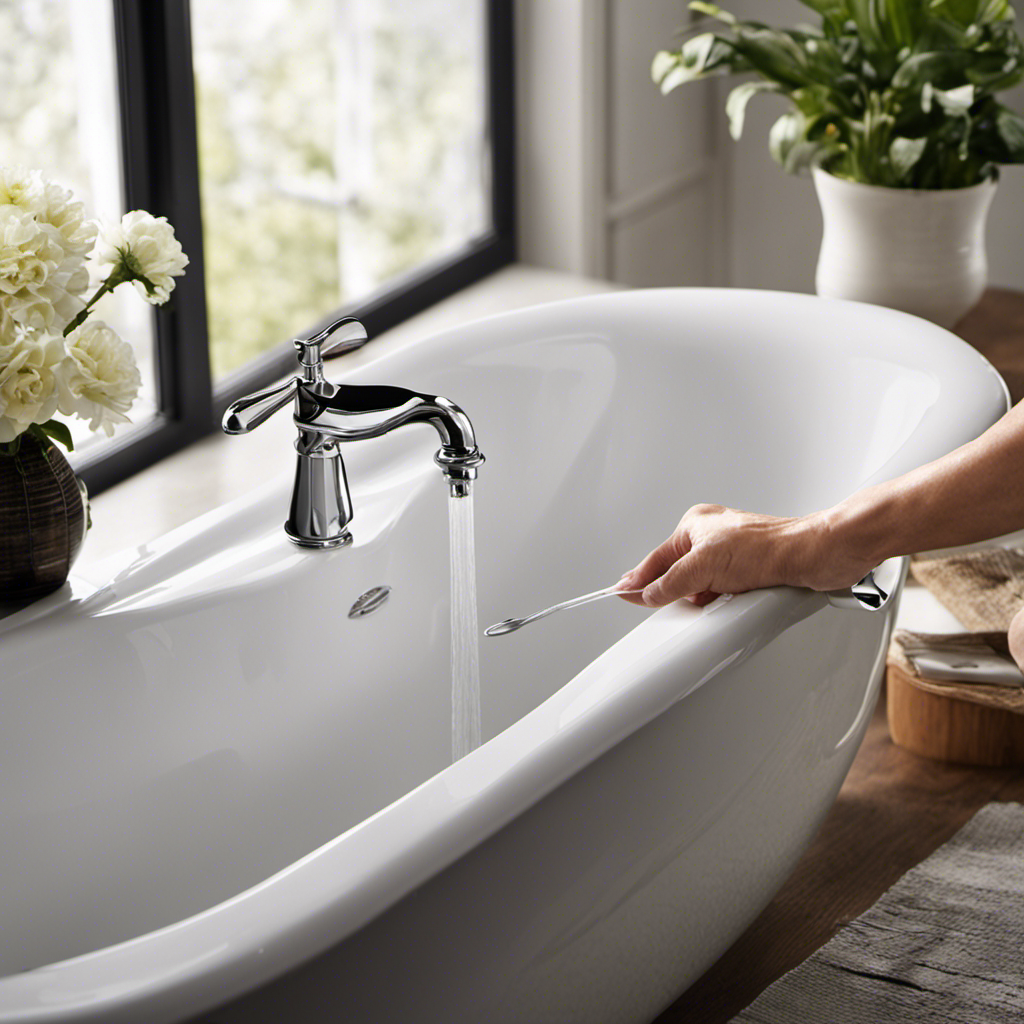Have you ever wondered why your beloved feline companion has suddenly decided to use the bathtub as their personal litter box? It can be both frustrating and perplexing.
In this article, I will explore the possible reasons behind this peculiar behavior. From medical issues to changes in their routine, stress triggers, and environmental factors, there are various factors to consider.
By understanding the underlying causes, we can address this issue and help our furry friends find relief.
Key Takeaways
- Possible medical causes such as intestinal blockage or digestive disorders should be ruled out by consulting a veterinarian and discussing appropriate treatment options.
- Changes in litter box routine, such as litter box aversion, should be investigated. Providing multiple litter boxes with different types of litter and ensuring clean, easily accessible, and private litter box areas may help.
- Stress and anxiety triggers, including changes in environment or routine, should be addressed by creating a calm and peaceful environment, providing a designated safe space, and using pheromone diffusers or sprays. Establishing a consistent daily routine can also help reduce stress and anxiety.
- Environmental factors, such as maintaining a clean and odor-free litter box, introducing new pets slowly, and addressing the effect of new pets on stress levels, should be considered for a stress-free environment.
Possible Medical Causes
One possible reason why your cat is suddenly pooping in the bathtub could be due to medical issues. It is important to consider potential underlying health problems that could be causing this behavior change.
One such medical cause could be an intestinal blockage. This occurs when there is an obstruction in the cat’s digestive system, preventing the normal passage of stool. Common causes of intestinal blockage in cats include foreign objects, tumors, or hairballs.
Another possible medical cause could be digestive disorders. Conditions such as inflammatory bowel disease or irritable bowel syndrome can cause changes in bowel habits, leading to inappropriate elimination.
If your cat is consistently pooping in the bathtub, it is advisable to consult with a veterinarian to rule out any potential medical issues and to discuss appropriate treatment options.
Changes in Litter Box Routine
There’s been a shift in the litter box routine, so it’s important to investigate any changes that might have led to this new behavior.
Cats may develop a litter box aversion due to various reasons, including changes in their litter box training. If your cat suddenly starts pooping in the bathtub instead of the litter box, it could indicate a dislike for the current litter or the box itself.
Cats are known for their cleanliness, and any discomfort associated with the litter box can lead to this behavior. To address this issue, consider providing multiple litter boxes with different types of litter to see which one your cat prefers.
Additionally, ensure that the litter boxes are clean, easily accessible, and placed in quiet and private areas.
Stress and Anxiety Triggers
To help alleviate stress and anxiety triggers, you should create a calm and peaceful environment for your cat. Cats are sensitive creatures and changes in their environment or routine can lead to stress and anxiety, which may manifest in undesirable behaviors like pooping in the bathtub.
Here are some behavioral modifications and calming techniques you can try:
- Provide a designated safe space for your cat, such as a quiet room with their bed and toys.
- Use pheromone diffusers or sprays, like Feliway, to create a calming atmosphere.
- Establish a consistent daily routine for your cat, including regular playtime and feeding schedules.
- Consider incorporating interactive toys or puzzle feeders to mentally stimulate your cat and reduce stress.
Environmental Factors to Consider
Creating a calm and peaceful environment for your cat involves considering various environmental factors. These factors can greatly influence their overall well-being and behavior.
Two important factors to consider are bathroom hygiene and the effect of new pets on your cat’s stress levels. Maintaining a clean and odor-free litter box is essential for your cat’s bathroom habits. Cats are naturally clean animals, and they prefer a clean and hygienic environment for their bathroom needs.
Additionally, the presence of new pets in the household can cause stress and anxiety for your cat, leading to behavioral issues such as inappropriate elimination. It is important to introduce new pets slowly and provide safe spaces for your cat to retreat to.
By addressing these environmental factors, you can help create a peaceful and stress-free environment for your cat.
Moving on to the next section, let’s explore some behavioral issues to address.
Behavioral Issues to Address
Addressing behavioral issues in your cat involves understanding the underlying causes and implementing appropriate strategies to modify their behavior. Some common behavioral issues in cats can include aggression, excessive scratching, inappropriate elimination, and excessive vocalization.
Here are some key points to consider when addressing these issues:
-
Positive reinforcement techniques: Using positive reinforcement, such as treats or praise, can help encourage desired behaviors and discourage unwanted ones. For example, rewarding your cat for using the litter box can help reinforce the desired behavior.
-
Environmental enrichment: Providing a stimulating environment with plenty of toys, scratching posts, and hiding spots can help alleviate boredom and redirect negative behaviors.
-
Consistency and routine: Establishing a consistent routine for feeding, playtime, and litter box cleaning can help reduce stress and promote positive behaviors.
-
Seeking professional help: If your cat’s behavioral issues persist or worsen, it may be beneficial to seek the assistance of a professional animal behaviorist or veterinarian who specializes in feline behavior. They can provide guidance and develop a tailored behavior modification plan for your cat.
Conclusion
In conclusion, there can be several reasons why a cat may suddenly start pooping in the bathtub. It is important to consider possible medical causes such as digestive issues or urinary tract infections.
Changes in litter box routine, stress, and anxiety triggers, as well as environmental factors, should also be taken into account. Addressing any behavioral issues is crucial in resolving this problem.
Remember, finding your feline friend’s preferred pooping spot is like searching for a needle in a haystack.
